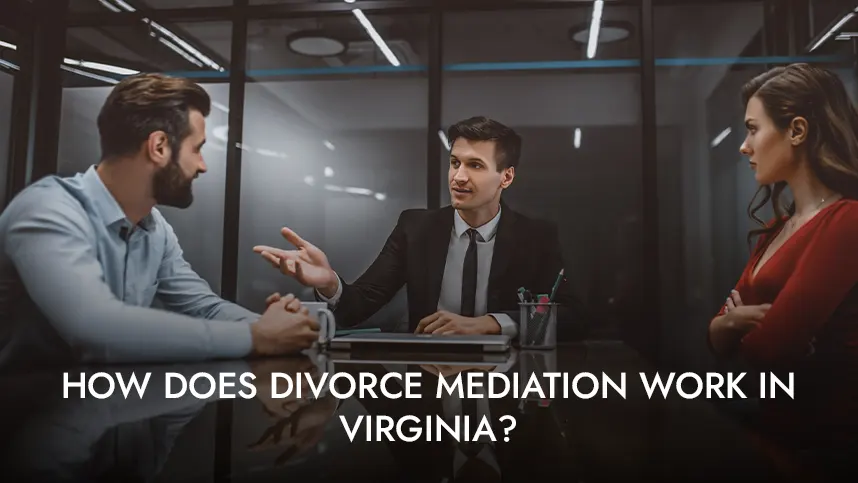Divorce is never easy, but it doesn’t have to be a drawn-out, contentious battle. In Virginia, many couples are turning to mediation as a more amicable and cost-effective alternative to traditional litigation.
As a family law firm dedicated to changing the way people think about legal services, we at Holcomb Law, PC believe in empowering our clients with knowledge. Let’s dive into the world of divorce mediation in Virginia and explore how this process can help you navigate one of life’s most challenging transitions.
Understanding Divorce Mediation in Virginia
Divorce mediation is a process where a neutral third party, the mediator, helps couples reach mutually acceptable agreements on various aspects of their divorce. It’s like having a skilled navigator to help you chart a course through choppy waters.
Imagine Sarah and Mike, a couple married for 15 years, deciding to part ways. They’re both reasonable people who want to avoid the stress and expense of a court battle. This is where divorce mediation comes into play. The couple may voluntarily participate in this process to resolve any disagreement and arrive at a consensus for their divorce settlement.
The Benefits of Choosing Mediation
- Cost-effective: Mediation typically costs less than litigation.
- Time-saving: The process is often faster than going to court.
- Confidential: Unlike court proceedings, mediation is private.
- Empowering: Couples maintain control over decisions affecting their lives.
- Less stressful: The collaborative nature of mediation can reduce emotional strain.
The Mediation Process in Virginia
Step 1: Choosing a Mediator
Choosing the right mediator is crucial – you want someone who’s not only knowledgeable but also a good fit for your situation.
In Virginia, mediators must be certified by the Judicial Council of Virginia. You can find them through directories, but at Holcomb Law, we have certified mediators who have decades of experience. We understand the nuances of Virginia family law and the personal dynamics between divorcing spouses.
Step 2: Initial Consultation
The process typically begins with an initial meeting where the mediator explains the process, sets ground rules, and identifies the issues that need to be resolved. This is where Sarah and Mike would outline their concerns and goals for the mediation.
Step 3: Information Gathering
Both parties need to provide full financial disclosure. This includes:
- Income statements
- Bank account details
- Property valuations
- Debt information.
Transparency is key here. The mediator can’t help you reach a fair agreement without all the facts on the table.
Step 4: Negotiation Sessions
This is the heart of the mediation process. The mediator facilitates discussions on various issues such as:
- Property division: How will assets and debts be split?
- Spousal support: Will one party provide financial support to the other?
- Child custody and support: If there are children involved, what arrangements will be made for their care and financial support?
The mediator helps keep discussions productive and focused, offering suggestions when needed but never making decisions for the couple.
Step 5: Drafting the Agreement
Once agreements are reached, the mediator drafts a Memorandum of Understanding. This document outlines all the decisions made during mediation. Note that this isn’t a legally binding document yet.
Step 6: Legal Review
Both parties should have their own attorneys review the agreement. At Holcomb Law, we can provide this service, ensuring that your rights are protected and the agreement is fair.
Step 7: Finalizing the Divorce
Once both parties are satisfied with the agreement, it’s submitted to the court for approval. If the judge finds the agreement fair and in line with Virginia law, it becomes part of the final divorce decree.
Special Considerations When Mediating in Virginia
Equitable Distribution State
Due to Virginia’s equitable distribution laws, marital property is distributed equitably rather than always evenly. In mediation, property division negotiations are guided by this premise.
Military Divorces
With a significant military presence in Virginia, many divorces involve service members. Mediation can be particularly beneficial in these cases, allowing for flexible scheduling and addressing unique issues like deployment and military pensions.
Child-Related Issues
When children are involved, Virginia law requires that their best interests be the primary consideration. Mediators help parents focus on creating parenting plans that prioritize the children’s well-being.
When Mediation Might Not Be Suitable
While mediation is often beneficial, it’s not always the best choice. The following are some situations where mediation may not be suitable and litigation might be necessary:
- Cases involving domestic violence
- When one party is hiding assets
- If there’s a significant power imbalance between parties
- Extreme high conflict divorces.
At Holcomb Law, we can help you determine if mediation is right for your situation.
The Role of Attorneys in Mediation
While mediators facilitate discussions, they can’t provide legal advice. That’s where attorneys come in. Our divorce lawyers at Holcomb Law can:
- Advise you on your rights before and during mediation
- Review agreements to ensure they’re fair and legally sound
- Prepare necessary court documents.
Remember, having legal counsel doesn’t mean you’re gearing up for a fight. It’s about ensuring you’re making informed decisions.
Post-Mediation: Implementing the Agreement
Once your divorce is finalized, the work isn’t over. You’ll need to:
- Transfer property as agreed
- Update beneficiaries on insurance policies and retirement accounts
- Establish new financial accounts
- Implement the parenting plan.
Talk to us at Holcomb Law to help you navigate these post-divorce tasks, ensuring a smooth transition to your new life.
FAQ: How Does Divorce Mediation Work in Virginia?
What is the average duration of divorce mediation in Virginia?
The duration of divorce mediation in Virginia can vary significantly depending on the complexity of the issues involved and the willingness of both parties to cooperate. On average, the process can take anywhere from three to six months. However, some cases may be resolved in as little as a few weeks, while others might take up to a year.
Several factors can influence the timeline:
- Complexity of assets: If there are numerous or complex assets to divide, such as businesses or multiple properties, it may take longer to reach an agreement.
- Child-related issues: Discussions about custody, visitation, and child support can be time-consuming, especially if parents have differing views.
- Emotional readiness: If one or both parties are not emotionally prepared for divorce, it can slow down the process.
- Scheduling: The availability of both parties and the mediator can affect how quickly sessions can be scheduled.
While mediation is often faster than litigation, rushing through the process isn’t advisable. Taking the time to thoroughly address all issues can lead to a more sustainable agreement in the long run.
How much does divorce mediation cost in Virginia compared to litigation?
Divorce mediation in Virginia is generally significantly less expensive than traditional litigation. While costs can vary, mediation typically ranges from $3,000 to $8,000, depending on the case’s complexity and the number of sessions required. In contrast, litigated divorces can easily cost $15,000 to $30,000 or more per spouse.
Here’s a breakdown of potential costs in mediation:
- Mediator fees: Mediators in Virginia typically charge between $300 and $400 per hour. Most cases require three to eight sessions, each lasting two to three hours.
- Attorney fees: Even if you use a mediator, it’s advisable to have an attorney review your agreement. This might cost $1,000 to $3,000, depending on the intricacies of your case.
- Filing fees: Court filing fees in Virginia are typically around $100.
In contrast, litigation involves:
- Higher attorney fees: Lawyers often require substantial retainers, typically charging $250 to $500 per hour.
- Court costs: These can add up quickly, especially if there are multiple hearings.
- Expert witness fees: If your case requires financial experts or child custody evaluators, costs can increase significantly.
At Holcomb Law, we believe in transparency about costs. When you first consult with us, we’ll provide a clear estimate of potential mediation expenses upfront, helping you make an informed decision about your divorce process.
Can I still go to court if mediation doesn’t work?
Absolutely. Engaging in mediation does not waive your right to pursue litigation if an agreement cannot be reached. In fact, many couples in Virginia attempt mediation first, and if unsuccessful, then proceed to court. Here’s what you need to know:
- Voluntary process: Mediation is entirely voluntary. Either party can choose to end the mediation at any time and pursue litigation instead.
- Partial agreements: Even if you don’t resolve all issues in mediation, any agreements you do reach can potentially be used in court, reducing the number of contested issues.
- Confidentiality: Discussions in mediation are confidential and generally cannot be used in court. This allows for more open negotiations without fear of statements being used against you later.
- Timing: You can transition to litigation at any point in the mediation process. Some couples realize early on that mediation isn’t working, while others may try for months before deciding to go to court.
- Court requirements: Some Virginia courts require couples to attempt mediation before litigation. Even if you’ve already decided mediation won’t work, you may need to attend a session to satisfy this requirement.
You can count on Holcomb Law to guide you through both mediation and litigation processes. If mediation isn’t successful, we’re prepared to advocate for you in court, armed with a thorough understanding of your case from the mediation process.
How do I choose a divorce mediator in Virginia?
In Virginia, mediators must be certified by the Judicial Council of Virginia, but beyond this basic requirement, there are several factors to consider:
- Experience: Look for a mediator with substantial experience in family law mediation. Ask about their success rate and the types of cases they typically handle.
- Style: Mediators have different approaches. Some are more directive, while others are more facilitative. Consider which style might work best for your situation.
- Credentials: While all certified mediators meet basic requirements, some have additional qualifications, such as being attorneys or mental health professionals.
- Compatibility: It’s important that both you and your spouse feel comfortable with the mediator. Many offer a free initial consultation, which can help you gauge this.
- Availability: Consider the mediator’s schedule and location. Ensure they can accommodate your needs.
- Fees: Understand their fee structure upfront. Some charge by the hour, others by the session.
- References: Don’t hesitate to ask for and check references from past clients.
At Holcomb Law, we have certified mediators on staff who are also experienced family law attorneys. This dual expertise can be particularly beneficial in complex cases. We’re happy to discuss our mediation services and help you determine if we’re the right fit for your needs.
What if my spouse is uncooperative during mediation?
Dealing with an uncooperative spouse can be challenging, but it doesn’t necessarily mean mediation will fail. Here are some strategies and considerations:
- Role of the mediator: A skilled mediator can help manage difficult behaviors and keep discussions productive. They may use techniques like caucusing (meeting with each spouse separately) to address concerns.
- Setting ground rules: Establish clear rules at the beginning of mediation about respectful communication and participation.
- Taking breaks: If tensions rise, the mediator may suggest taking a break or even scheduling sessions on different days.
- Focusing on interests: The mediator can help redirect focus from positions (“I want the house”) to underlying interests (“I need financial security”), which can often lead to more productive negotiations.
- Reality testing: Sometimes, an uncooperative spouse may have unrealistic expectations. The mediator can help by asking questions that encourage a more realistic perspective.
- Involving attorneys: While not always present in mediation sessions, having attorneys review agreements between sessions can help keep things on track.
- Considering termination: If one spouse consistently refuses to participate in good faith, it may be necessary to end mediation and consider other options.
The truth is that not all mediations are smooth sailing, but our experienced mediators at Holcomb Law are skilled at handling challenging situations. We can help you address difficulties with an uncooperative spouse. If mediation ultimately proves unworkable, we’re prepared to shift gears and represent you in litigation if necessary.
Note that while cooperation is ideal, it’s not always required for mediation to be successful. Sometimes, simply having a neutral third party present can help move discussions forward, even with a reluctant participant.
Considering Divorce Mediation? Holcomb Law Has Experienced Mediators Who Are Also Family Lawyers.
Divorce mediation in Virginia offers a path to resolution that can be less stressful, more cost-effective, and more empowering than traditional litigation. At Holcomb Law, PC, we can assist you through this process, ensuring you understand each step and make decisions that serve your best interests.
If you’re considering divorce and want to explore whether mediation might be right for you, don’t hesitate to reach out to us at Holcomb Law. Call us at (757) 656-1000 for a consultation. We’re here to support you through this difficult period with understanding, know-how, and a dedication to your wellbeing.










